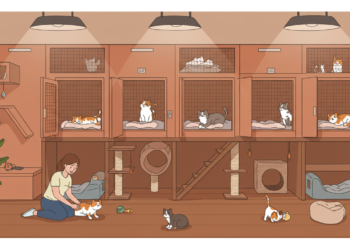A cat can be very sweet one moment and display unwanted behavior the next, for example, that you are petting him and he suddenly grabs you. There can be all kinds of reasons for this, such as medical problems, stress, wrong upbringing to wrong training. Sometimes you may not even realize it and contribute to unwanted behavior. Why does the cat behave this way and what can you do about it?
Unwanted behavior
A cat can be purring on your lap one moment and when you pet it, it can suddenly turn into a wild animal that wants to grab you. To want to change the cat’s behavior, you need to be calm and have a lot of patience. You need to change the cat’s behavior in such a way that you are both at peace with it. It is difficult to unlearn a cat. The method is to reward good behavior.
Adjust to each other
A cat has a lot to learn when it comes to living with you. It can work very well if the bond between you is good. In this way, the cat can learn to use the litter box instead of defecating elsewhere and thereby marking its territory. He learns where to scratch and where not to scratch. The cat will adapt its sleep schedule to your daily schedule. Most cats adapt well. In the case of cats that don’t, you need to find out why they don’t before you can fix the problem.
Reading suggestions; Boy Cat Names; Find the Perfect Male Kitten Name
Medical problems
Behavioral problems can be a sign of illness. For example, a cat with untreated diabetes will drink more and therefore urinate more. As a result, the litter box needs to be cleaned more often. If you don’t realize that the cat finds its bowl too dirty, it will look for other places to urinate.
A cat that suddenly starts to bite may be in pain and lashing out just to protect itself. If a cat has a urinary tract infection, urinating can be painful, causing him to associate the pain with the litter box and avoid the litter box. Using all behavioral techniques simply cannot solve a medical problem. You have to go to the vet for that.
stress
A cat does not like changes and if they do happen, for example by introducing a new pet or person, the cat can mark the territory everywhere. This is logical behavior for the cat and it has a calming effect. By spreading his own scent he feels comfortable and this is very unpleasant for you.
If your cat is very stressed and shows unwanted behavior as a result, you can calm him down by temporarily making his territory smaller. Keep him temporarily (for example a few days) in a small room where he feels calm. If that goes well, gradually let him get used to the larger space again. If this does not work, you can give medication for this.
unreasonable demands
You can also make a contribution – often unconsciously – to the behavioral problem. There may be things that a cat cannot possibly comply with. For example, your cat does not want to use the litter box because it is not clean enough. And it’s also not fair that you ask him to leave the couch alone if there is nothing else in the house to scratch. You have to offer him some alternatives before you can hope for behavior improvement that sometimes requires patience.
Reading suggestions; The cat’s whiskers
Boredom
The cat lives in an unnatural world in the house. If there are only a few hours every day where he gets company and only has a few toys lying around, there is a good chance that boredom will set in.
Indoor cats, in particular, need a lot of things to entertain themselves: lots of toys and lots of games, as well as lots of attention from you. Cat toys at the pet store are pricey. You can also be creative and make fun toys for your cat. If you are away from home a lot, another cat can stimulate your pet and keep it company.
Incorrect training from the start
If you’re just yelling or maybe even slapping your cat, chances are you’re only teaching him that you’re someone he’d better avoid. The physical correction has absolutely no effect on a cat and the cat will not understand this. Beating him will only make the unwanted behavior worse and make the cat very neurotic.
Work on the desired behavior
Observe your cat closely and see how your cat reacts in certain situations. Also, pay attention to how you react to this. You can keep a diary in which you write down all the problems. This way you can find out exactly when problems arise and you can work to prevent them in the future.
This will reduce tension in your relationship. The cat is not a hateful and capricious animal and does not understand that its behavior is undesirable. The most important thing is to reward good behavior and this will motivate the cat to do it again the next time.








